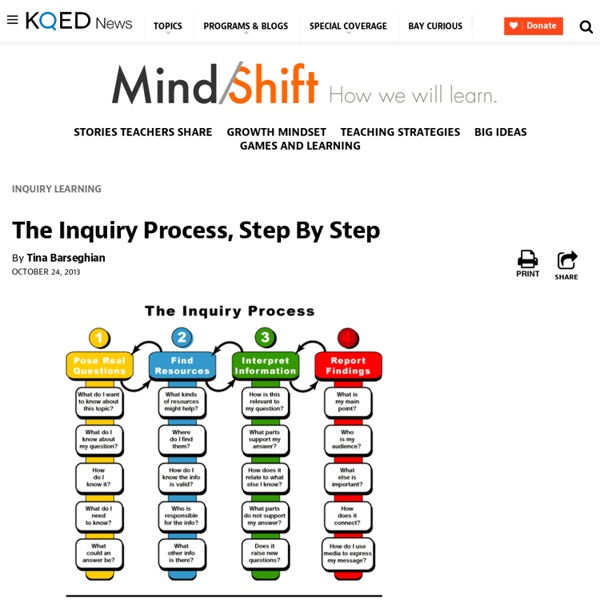



http://ww2.kqed.org/mindshift/2013/10/24/the-inquiry-process/
Related: Inquiry-Based Learning • SAMR, STEM, Guided Inquiryeducationalresearchtechniques Inquiry learning is form of indirect instruction. Indirect instruction is teaching in which the students are actively involved in their learning by seeking solutions to problems or questions. In inquiry learning, students develop and investigate questions that they may have. The focus in inquiry learning is on what the students want to learn with some support from the teacher about a topic. Below are the steps of inquiry learning. AskInvestigateCreateDiscussReflect How to Design a Classroom Built on Inquiry, Openness and Trust Teachers who are interested in shifting their classrooms often don’t know where to start. It can be overwhelming, frightening, and even discouraging, especially when no one else around you seems to think the system is broken. A question I’m asked often is, “Where should a teacher begin?”
20 Questions To Guide Inquiry-Based Learning 20 Questions To Guide Inquiry-Based Learning Recently we took at look at the phases of inquiry-based learning through a framework, and even apps that were conducive to inquiry-based learning on the iPad. During our research for the phases framework, we stumbled across the following breakdown of the inquiry process for learning on 21stcenturyhsie.weebly.com (who offer the references that appear below the graphic). Most helpfully, it offers 20 questions that can guide student research at any stage, including:
Mastering Assessment Language: Trusty Tips and Tools The formative assessment rubric is an amazing and revealing tool. They are made all the more effective by carefully considering the language we use. Mastering assessment language is an art form in itself. Reinventing School From the Ground Up For Inquiry Learning By Thom Markham A grave miscalculation exists in the minds of many educators: That inquiry-based learning, project based learning, and 21st century competencies can flourish in industrial model schools. Under this world view, the inquiry goals of the Common Core State Standards are “strategies” to be added to the existing list of classroom techniques, while skills like collaboration, communication, or creativity can be taught despite 43-minute periods, desks in rows, and pacing guides set in stone.
35 Educational Resources to Encourage Inquiry & Inventive Thinking This is a sponsored post. I’ve scoured the internet, including all of my favourite social media sites, to bring you a fantastic collection of online inquiry and inventive thinking resources that I know will inspire and motivate both you and your students. The collection includes Lego, science, practical activity ideas, engineering, videos, animation, technology and a tonne of fun facts – so there is sure to be something for everyone!
Inquiry Learning Ideas for Math and Science With iPads Digital Tools Laurie Sullivan/Flickr By Sam Gliksman The following is the second of a series of excerpts from Gliksman’s book iPad in Education for Dummies. The Phases of Inquiry-Based Teaching A central goal of education is teaching critical-thinking skills. Inquiry-based teaching is an excellent path to this goal. Based partly on the philosophy that “humans are born inquirers,” the method focuses on student discovery over pushing information from the instructor. Creating Classrooms We Need: 8 Ways Into Inquiry Learning If kids can access information from sources other than school, and if school is no longer the only place where information lives, what, then happens to the role of this institution? “Our whole reason for showing up for school has changed, but infrastructure has stayed behind,” said Diana Laufenberg, who taught history at the progressive public school Science Leadership Academy for many years. Laufenberg provided some insight into how she guided students to find their own learning paths at school, and enumerated some of these ideas at SXSWEdu last week. 1.
Part 4: STEM, STEAM, Makers: Turning STEM to STEAM… 24 Resources Welcome to this fourth post in a series that brings STEM, STEAM, and Maker Space together with Project Based Learning and proper technology integration in the classroom. You will discover around one hundred resources in this series along with some great ideas for finding student success. Before reading, please take a moment to subscribe by email or RSS and also give me a follow on Twitter at mjgormans. I promise you will find some great information coming your way in the posts that follow…So sign up now and please pass this on with a retweet. – Mike Gorman ( Booking Info – It is time to think about your school or conference needs.